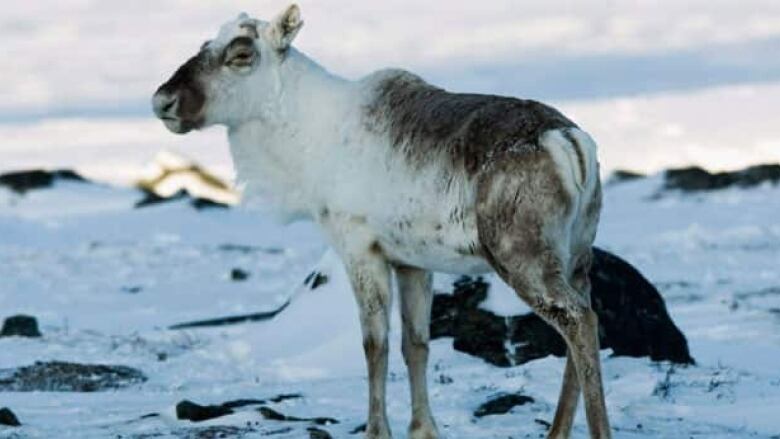Inuit hunting market: cultural betrayal or necessity?
Study says selling hunted meat is one way to ensure food supply gets to all families in Nunavut

The hunter grabs one of his delicacies by itsfurry, frozen ear and waves it in the air.
"Caribou heads for sale!" he cries. "Caribou heads for sale!"
Eager for the makings of a tasty soup, customers flock to histable at an open-air market in Iqaluit, where fresh-from-the-landfood has been an occasional offer since 2010. Tables piled withcaribou, seabirds, seaweed, seal the "country foods" of thetraditional Inuit diet sell out in minutes.
Meanwhile, Facebook groups for the buying, selling and trading ofcountry foods, from fish eggs to muskox, now have thousands ofmembers.
A whole caribou? Without the hide, $300. Arctic char? Each fish,$20.
Faced with the growing cost of gas for their snowmobiles andbullets for their guns, Inuit hunters are increasingly putting theirharvest up for sale.
Some say it's a good way to keep hunters on the land,office-bound Inuit in touch with their roots and other people from goinghungry in communities where store-bought groceries are expensive.
Others worry though about the safety of uninspected meat and thepossible overhunting of now-valuable game animals.
And some call selling game a betrayal of sacred Inuit traditions.
"People that are still thinking in the old tradition say thatit's not the Inuit way of life to sell to others," said JamesEetoolook of Nunavut Tunngavik Inc., which looks after the Nunavutland claim. "You have to share what you have."
Sharing a hunt's bounty is still common, but under their landclaim, Inuit also have the right to sell it.
Building Inuit food supply
A recent study by the Royal Society of Canada suggested selling a hunter's bountymight be one way to increase the overall food supply and ensure allInuit can feed their families.
Research has found nearly three-quarters of Inuit preschoolerslive in homes without a sure supply of food;half of youths between11 and 15 sometimes go to bed hungry; and two-thirds of Inuit parentsalso told a survey that they sometimes ran out of food and couldn'tafford more.
"If people can't get their traditional country food with theirown family, then they have to get it somewhere," said co-authorHarriet Kuhlein.
"To commoditize it will help some people get it. It's one partof the picture."
Will Hyndman, who organizes the Iqaluit market, said there aremany reasons it's so popular.
"In Iqaluit, there's a lot of Inuit who come from othercommunities. They might not have their own gear or they don't knowthe land around here or they're separated from their traditionalsharing circle. A lot of seniors don't get access to as much as theywant."
Some staples, such as caribou, simply aren't available everywherebecause local herds are too small to hunt. Selling game from aregion where they are plentiful gives everyone access, saidEetoolook.
It's also a way for Inuit to earn money from what they do best.
"The cost of snow machines or any other machines are very highnow," Eetoolook said. "You need money in order to live thesedays."
A stress on caribou herds
Drikus Gissing of Nunavut's Environment Department acknowledgesthat the chance to make a dollar from a buck could put pressure oncaribou herds.
"We are concerned, especially with the large amounts of cariboubeing shipped from the mainland to the Baffin region. But we cannotlimit that trade unless we can prove there's a conservationconcern."
The department plans to survey caribou herds in central Nunavutthis spring, in part to determine the impact of market hunting. Ifthere is a problem, the department has to convince the NunavutWildlife Management Board to impose a total allowable harvest.
"That's the only way of restricting the harvest," Gissing said.
None of the food for sale has been inspected, with the exceptionof walrus, which is prone to the parasite that causes trichinosis.
But Wanda Joy of Nunavut's Health Department said that hasn'tbeen a problem. Given the territory's weather, most of the food iskept frozen from tundra to table.
"Hunters take their traditional knowledge in terms ofpreparation and hunting and butchering," said Joy. "We don't see ahuge potential for anything to go wrong."
Still, Eetoolook acknowledges something will have to be done.
"We need to know whether the country food is safe to eat. Wedon't have that kind of establishment. We are talking about it andeventually it will be available, I hope, in the near future."
Eetoolook knows that won't end the opposition fromtraditionalists.
"Why sell the food you get for free?" wrote one poster on afood-trading Facebook site. "All of you should trade like ourancestors did."
"As an Inuk, I don't feel like paying for country foods," wroteanother. "Like my grandfather used to say, they're not for sale atall."
It's a generational divide, Eetookook said.
"I think we need to protect the traditional values forever. Butthe world is changing and the Inuit are changing as well."












_(720p).jpg)


 OFFICIAL HD MUSIC VIDEO.jpg)
.jpg)



























































































